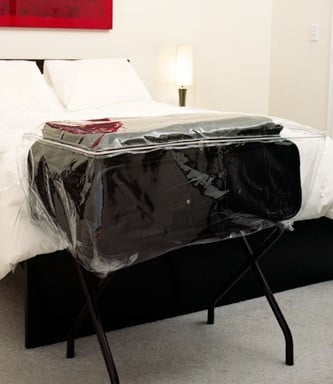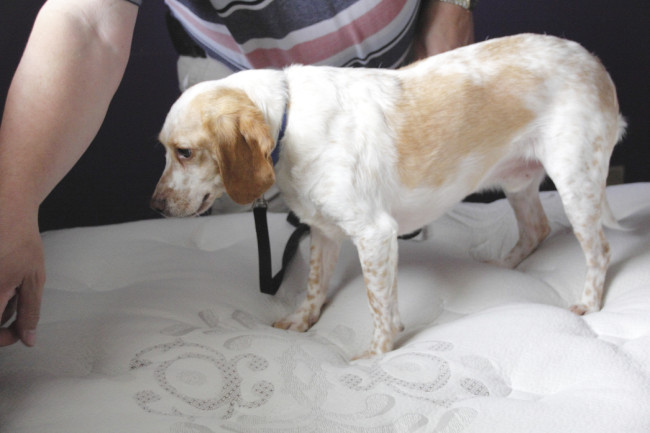Should you pay for a pest inspection before closing on an apartment?

iStock
A home pest infestation is one of the most traumatic experiences a New Yorker can have. Ask anyone who has had bedbugs how their life was altered by that experience. Renters are somewhat protected from the fallout of bed bug infestations by a patchwork of laws governing disclosure and responsibility, but if you are a homeowner or are looking to buy, the onus falls on you to maintain a pest-free environment.
Knowledge and prevention are the ultimate antidote to pests. Ideally, you would move into your new home assured that you won’t be sharing the space with bed bugs, mice, roaches, termites, or any other pests. But while it is common to have an inspection of structural elements of your apartment or house before moving in, prospective homeowners don’t usually get a pest inspection. Should they?
Brick Underground spoke with a half-dozen inspectors and exterminators to get an answer. Unsurprisingly, they resoundingly recommended a home pest inspection before closing on a property. And there are a few tips and facts that buyers should keep in mind.
First thing’s first: When it comes to real estate disclosures, New York is a caveat emptor or "buyer-beware" state, meaning the seller is not required to disclose information about a property to the buyer. It’s up to the purchaser to do whatever kind of inspections they want. But it is against the law for sellers to knowingly provide false information, so it is in your best interest as a buyer to ask questions. Doing so can foster discussion, bringing to light any issues that may be in the apartment’s history.
Asking lots of questions should be part of an overall strategy of getting information from as many sources as possible, says Adam Stone, a partner at The Stone Law Firm. You should also go on the HPD's website and check an address for bed bug violations; have your lawyer go through the building’s board meeting minutes to search for discussion of pest problems; and directly ask the managing agent about any complaints of insects, rodents, other types of nuisances.
Stone also recommends adding a term to the contract along the lines of: ‘The seller has no knowledge of any bed bug or pest infestation in the apartment in the last two years. “That’s a typical clause to add to a contract,” he says.
Follow up this preliminary talk with action. It’s worth having a pest inspection before closing for two big reasons: 1) a de rigeur overall inspection of the property will likely miss the subtle signs that indicate a pest problem; and 2) if there is an issue, it is much, much easier to solve it before moving in.
A typical home inspection won’t search between floorboards—where termites, bed bugs, and beetles love to hide out—or in the walls, and if the owner has cleaned up the place, it could miss other signs of pests, such as droppings, which are the key indicator for mice.
“Usually a home inspector will only inspect things that are accessible,” says Timothy Wong, managing partner at M&M Environmental. “They won’t go out of their way to check things that a typical pest inspection can involve. They don’t want to be liable for breaking anything, and they’re not trained to look for pests anyway.”
Every expert recommended having an inspection done before moving in, for obvious reasons: it is much easier to find, and take care of, any problems if there’s no furniture in the apartment.
That’s also the time to do exclusion work: Sealing up any potential openings for mice and roaches.
“When a person moves into an empty apartment, nothing is more important than sealing up all the holes where pipes go through the wall or floor,” says Ben Pearlman, founder and CEO of Positive Pest Management. New apartments are not immune, either, because builders seldom consult with pest management professionals to make sure apartments are pest-proof.
Prewar buildings have specific issues that don’t apply to new buildings. Chief among them is that the floors settle, which creates a gap below the baseboard around the entire apartment. “That looks like light to a pest in the wall,” Pearlman explains. “That should be looked at while the apartment is empty, before furniture is moved in. The other prewar issue is gaps in hardwood floors, which are a major hiding spot for bedbugs and carpet beetles.”
Finally, if you do decide to get a pest inspection, make sure you are diligent about hiring a reputable company. Pesticides are a controlled substance, and federal law requires anyone who administers them to be certified in accordance with EPA and state-level regulations. Pick a company that is certified, and as always, read reviews. There are also companies that certify bed bug detection dogs.
Buyers should be particularly wary of hiring an exterminator who is affiliated with an inspection company, says Richard Kane, the founder and CEO of Pest Prep NYC, one of the few New York-area companies that prepares apartments for extermination after an inspection has been done.
“If you have an inspection, you have to have the right inspector doing it. There is no accountability—there should be a third party that does inspections before, during, and after [move in].”
“There are shady people out there, just like in any other business,” says Scott Palatnik, owner of Long Island Bed Bug Inspections. “It’s all about the integrity of the company you work with. Getting an inspection gives a lot of people peace of mind. Who wants to move into a place that’s already infested?”
You Might Also Like





























